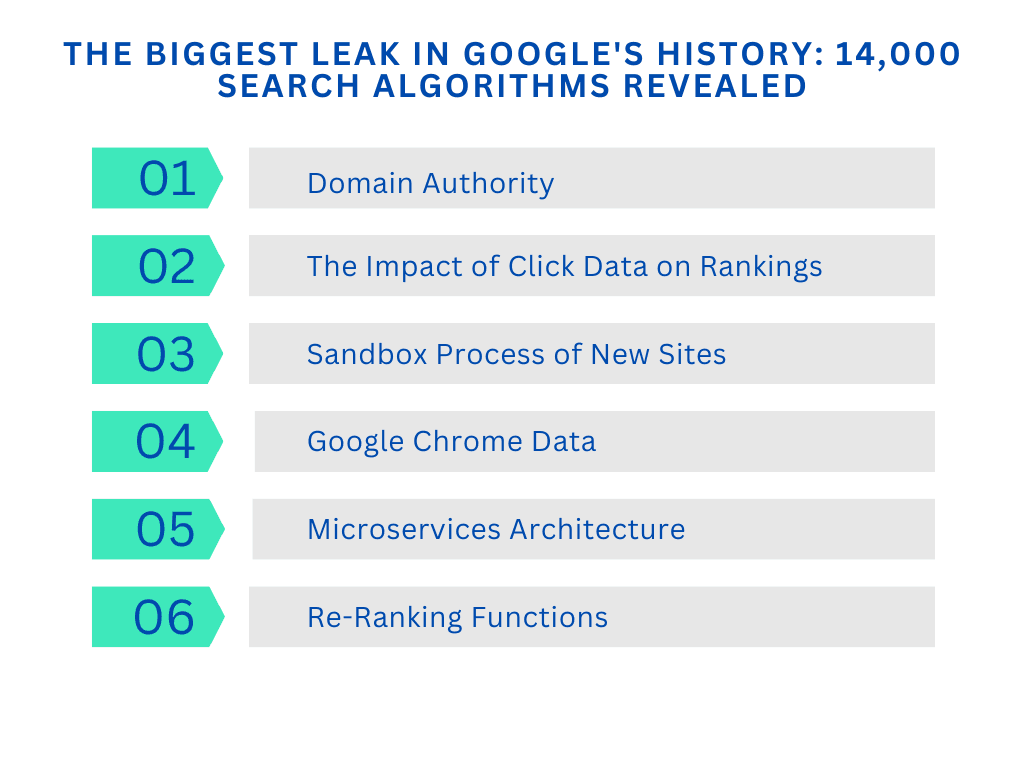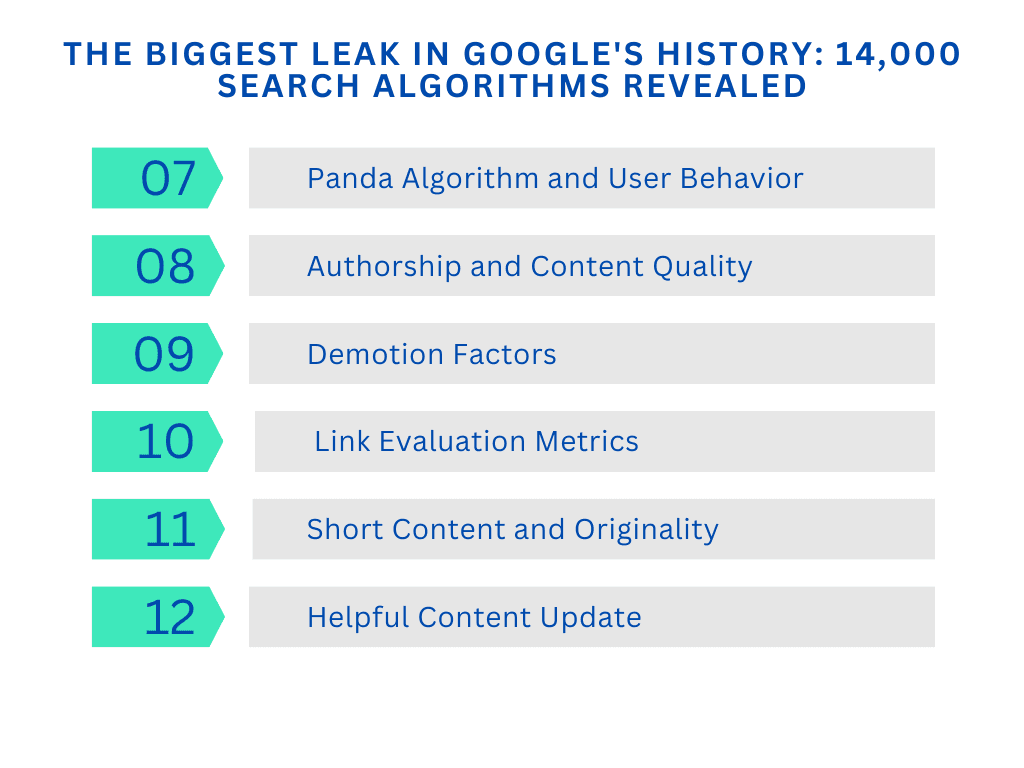

The Biggest Leak in Google's History: 14,000 Search Algorithms Revealed
Byte Blog • June 10, 2024
Google has experienced an unprecedented leak that has shocked the world of digital marketing and SEO.
Google has experienced an unprecedented leak that has shocked the world of digital marketing and SEO. The revelation of 14,000 different ranking factors of Google's search algorithm overturns everything SEO experts and digital marketers have ever known. This massive data set has the potential to explain in detail the factors that determine the ranking of websites and reveal the mysteries behind Google's complex algorithm. If you want to learn more about how this information will reshape SEO strategies, you can read the rest of our article.
How The Leak Changes Everything You Know About SEO
In this article, we will discuss a significant development that could completely alter your current understanding of SEO. Just imagine having access to all the details of Google's search ranking algorithm. While it might seem impossible, a recent leak has made this dream a possibility! An anonymous source leaked more than 14,000 Google search ranking factors, making a splash. Understanding the information from this leak is crucial for anyone looking to succeed in search engine optimization (SEO) as this could herald significant changes in SEO strategies.
What Can We Learn About SEO from the Leaked Documents
Analyzing and studying 14,000 different ranking factors is a lengthy and exhausting process. However, experts have examined the leaked documents and compiled the information that can be learned from this leak.


Domain Authority
The leak confirms that Google measures site-wide authority, which overlaps with the metric many SEO experts refer to as “domain authority”. This metric plays a critical role in determining a site's search engine rankings. Domain authority evaluates factors such as your site's credibility, popularity, and content quality, and is central to SEO strategies. The leak makes it clear that building a strong and authoritative site is essential to achieving high rankings.
Google considers site-wide authority to be a key factor in evaluating a site's ranking performance. Referred to as 'domain authority' among SEO experts, the concept has been the subject of speculation for many years, but its accuracy has now been confirmed. To achieve high rankings in search engine results, it's essential to establish a strong and authoritative online presence. Therefore, it's time to replace strategy based on guesswork and conjecture with proven approaches that emphasize the importance of domain authority.
The Impact of Click Data on Rankings
Despite Google's public denials, leaked documents have revealed that click data is used to influence rankings. These documents show that Google collects and analyzes click data through systems such as 'nav boost.' These systems study how users interact with search results, assess click-through rates and user behavior, and use this data in ranking algorithms. It proves that user engagement is a critical factor in search engine rankings.
Sandbox Process of New Sites
An analysis of the leaks reveals that the new sites were subjected to a trial period called a ‘sandbox’ by Google, in which their ranking potential was limited. The process also contradicts Google's past statements denying the existence of a sandbox. However, new sites can overcome these limitations by targeting less competitive keywords and quickly acquiring quality backlinks. Thus, it can achieve good rankings. The strategies can help new sites gain visibility in search engine results even during the sandbox process.
Google Chrome Data
Google Chrome data, including user browsing behavior, is incorporated into the ranking algorithm. The data assists Google in gaining a better understanding of user preferences and enhancing the relevance of search results. Ultimately, it leads to more accurate and satisfying search results, improving the overall user experience.
Microservices Architecture
A ranking system consists of a collection of various microservices rather than a single algorithm. The key systems are:
Trawler: Responsible for crawling web pages.
Alexandria: Manages the indexing processes.
Mustang: Handles the ranking process.
SuperRoot: Processes user queries.
These microservices work together to optimize the search engine ranking process and make it more effective.
Re-Ranking Functions
Google adjusts the search results using various re-ranking functions before presenting them to users. The functions include:
Nav Boost: Adjusts rankings based on user click data.
Quality Boost: Changes rankings based on content quality.
Real-Time Boost: Updates rankings in real-time based on new data.
The functions dynamically optimize search results to ensure users receive the most relevant and high-quality results.
Panda Algorithm and User Behavior
The Panda algorithm applies a scoring modifier at different levels, including domain, subdomain, and subdirectory. The modifier impacts ranking results by taking into account user behavior and external links. The approach underscores the significant role of user engagement metrics in ranking determinations. Furthermore, the Panda algorithm is a part of Google's initiative to enhance search results, guaranteeing that users find more relevant and higher-quality content.
Authorship and Content Quality
Google gives importance to authorship when assessing content quality by tracking author information. Content from reputable authors is more likely to rank higher. It highlights the need for reliable and authoritative content creators and reflects Google's commitment to providing users with high-quality content.
Demotion Factors
Leaked information reveals several demotion factors affecting search results, including:
Anchor Mismatch: Penalizes links where the anchor text does not match the linked content.
SERP Dissatisfaction: Adjusts rankings based on user dissatisfaction with search results.
Exact Match Domains: Lowers the ranking of domains that exactly match search queries while providing insufficient or low-quality content.
These factors are crucial parts of Google's algorithm designed to enhance search result quality and improve user experience.
Link Evaluation Metrics
Links are still of great importance. However, Google now uses criteria such as "Source Type" to evaluate the value of links when a page is indexed. This underscores the importance of securing high-quality backlinks from reputable sources. The metrics play a crucial role in determining a website's authority and rankings, necessitating careful planning of link strategies.
Short Content and Originality
The leaked information reveals Google's appreciation for the originality of short content and supports the practice of publishing short, to-the-point, unique articles. This challenges the notion that only long-form content performs well in search rankings.
Helpful Content Update
The "helpful content update," also known as the "baby panda," impacts how user-generated content is ranked. It underscores the importance of high-quality, user-centric content, even on platforms like Reddit and Quora. It is essential to ensure that your content is genuinely helpful and user-focused.
Looking for the full 14,000 leaked algorithm documents from Google?
You can find these detailed insights into Google's complex algorithm on GitHub. Here are the specific links where you can access these documents:
These resources provide valuable information for anyone interested in understanding Google's ranking algorithms and improving their SEO strategies.
A New Era in Digital Marketing: Reshape Your SEO Strategies with Google's Leak
In this article, we discussed the leak of over 14,000 of Google's search algorithms, which caused quite a stir in the world of digital marketing and SEO. The information from the leak provides valuable insights into how Google's ranking algorithm works and the parameters it assesses. It's important to note that many of the parameters from the leak are variables that SEO experts already consider. If you'd like to delve deeper into these strategies and their implementation beyond the leak, feel free to contact us by filling out the ultimate contact and offer form.